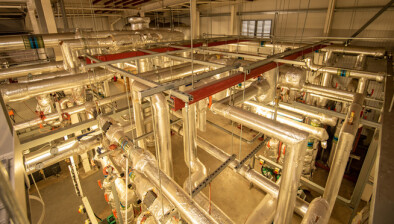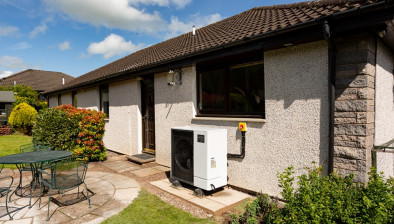Scottish Government opens call for views on Heat in Buildings Bill

Zero carbon buildings minister Patrick Harvie
Clean heating systems will replace polluting heating systems in Scotland’s homes and buildings by 2045 under new proposals published by the Scottish Government.
Under legislation to be introduced in 2025 which will start taking effect later in the decade, those buying new homes or buildings would be asked to move to a “clean” heating system, such as a heat pump or connection to a heat network, within a fixed period of time following that purchase.
Minimum energy efficiency standards for Scotland’s homes could also be introduced to make them warmer and less expensive to heat.
The Scottish Government is asking for views on proposals to form part of a Heat in Buildings Bill as set out in the Programme for Government.
Proposals include:
- That private rented homes will be required to meet a minimum energy efficiency standard no later than 2028;
- That owner-occupied homes will be required to meet the same minimum energy efficiency standard by the end of 2033;
- That all homes and non-domestic buildings will be required to end their use of polluting heating by the end of 2045; and
- In order to create a smooth trajectory towards 2045, that those purchasing a home or non-domestic property before 2045 would be required to end their use of polluting heating systems within a specific period following that purchase.
Also published are proposals for a new Social Housing Net Zero Standard that would require social landlords to meet an energy efficiency standard between 2033 and 2040 and install clean heating across their stock by 2045 where it is technically feasible and cost-effective to do so.
Speaking to our sister publication Scottish Housing News this morning, Mr Harvie said the proposals deliver the certainty and long-term planning that social landlords, developers and other impacted parties have long called for.
“We know where we need to get to by 2045,” he said. “Not just high performance in terms of energy standards and energy efficiency, but shifting away from fossil fuel for the way we heat our buildings. But we can’t wait until 2044 to see an impossible bottleneck, we need to give a clear sense of the direction of travel and confidence that this will continue to accelerate.”
“It has been accelerating, but we need to continue that trend progressively and we need businesses that housing developers work with, whether they are housebuilders themselves or other contractors, to have the confidence to invest in the skills and the capacity. We need to make it very clear to anyone who is looking at investing in the green transition that Scotland’s a great place to put your money and to build a business, whether innovating new products onto the market that will achieve the heat transition more affordably or just scaling up.
“In the construction sector, we’re already seeing changes of attitude and a lot less resistance to ambitious change than might have been the case 10 or 20 years ago. I think the construction sector knows that change is coming so we are working with the grain of that.”
Mr Harvie added: “Heat from our homes and buildings represents around 20% of Scotland’s carbon emissions. So there is no route to meeting our legal duty to be a net zero country by 2045 without making the heat transition. Making this transition can also liberate households and businesses from volatile fossil fuel prices.
“There will be no ‘one size fits all’ approach to what we’re proposing – we recognise that different types of buildings in different areas need different solutions – but today we are giving certainty to households to plan and clarity for businesses to invest, with a pathway which recognises the cost pressures that so many of us are currently facing.
“We’ve already passed regulations for new buildings, to apply from next year. If Parliament passes our Bill in 2025, then regulations will start to apply from 2028, with many more buildings moving away from fossil fuel through the 2030s. That will see Scotland on by far the most ambitious path within the UK, with a deployment of clean heating systems at a scale and pace very much faster than at present.
“The UK Government has the opportunity to match our ambition by using its reserved powers to take urgent action to reduce the price gap between gas and electricity, and by regulating energy companies to play their full part in this transition.”
The consultation also includes measures to encourage the development of heat networks. The proposals follow this year’s introduction of a new build heat standard which means that any buildings constructed under a new warrant from April 2024 must have a clean heating system.
The Existing Homes Alliance welcomed the consultation as a “step in the right direction”.
Lori McElroy, chair, said: “This consultation is a welcome step in the right direction – clear standards and regulations are a core part of the package needed to ensure Scotland’s homes are warm and more affordable to heat. They will help homeowners and landlords understand what they need to do to improve their homes over the coming years.
“Improving the energy efficiency of homes is key to reducing energy bills and by switching to zero emissions heating we can end households’ exposure to unstable fossil fuel prices – helping to lift people out of fuel poverty.
“As demonstrated in a recent letter to the First Minister signed by over 30 industry organisations, businesses are ready and willing to help meet the climate challenge but they need certainty. Clarity on standards and timescales will give businesses a clear pipeline of work, allowing them to scale up to meet growing demand.
“However, regulations won’t work on their own – they need to be accompanied by expanded advice and support services. We can learn from what is happening in other countries already, for example Ireland, where there is a network of one-stop shops which support people through the whole installation service.
“The Scottish Government must also move quickly on the recommendations of the Green Heat Finance Taskforce to develop mechanisms such as property linked finance so that warm homes with clean heating are affordable to all.”
Consumer Scotland head of energy Kate Morrison said: “Recent research published by Consumer Scotland found most consumers are concerned about climate change and want to do more to address it, but 67% of consumers either didn’t know or were unsure what they had to do to transition to net zero.
“The consultation represents the start of this discussion, helping consumers to understand what will be expected of them and the routes they can take to decarbonise their homes.
“Consumer Scotland will engage with the consultation to ensure that fairness in decision making and a strong focus on the consumer is embedded into the drafting of the Bill.”
British heat pump manufacturer Kensa welcomed the Scottish Government’s “progressive” proposals.
Group CEO Tamsin Lishman said: “As a proud Scot, I warmly welcome the launch of the Scottish Government’s consultation on proposals for a Heat in Buildings Bill - this Bill is urgently needed to provide clear legislation to support the decarbonisation of buildings across Scotland.
“Heating is the third-largest cause of greenhouse gas emissions in Scotland, upgrading our homes to clean, efficient zero-emissions heating is therefore absolutely essential if Scotland is to meet its climate change targets, tackle fuel poverty and achieve energy security.
“The Scottish Government’s proposals could be a major step in the right direction for the heat pump sector, setting out that by 2045, all building owners will need to stop using polluting heating.
“If the Scottish Government is to achieve this laudable aim, it must consider the use of all available heat pump technologies, such as networked heat pumps. This established approach, with a heat pump in each home connected to a third-party network in the road, will ensure all homes, from tenements to terraces to tower blocks, are able to access sustainable and affordable heat.
“Unrolling this technology on a street-by-street basis will require a more strategic approach to that taken to date, but the benefits are clear – lower energy consumption, lower energy bills, and an easier path to net zero. I look forward to responding to this consultation and working with the Scottish Government to make this a reality.”
The proposals have also been welcomed by the Scottish Government’s statutory advisers, the Climate Change Committee.
Chris Stark, chief executive of the Climate Change Committee, said: “These are bold proposals to decarbonise Scotland’s buildings over the next two decades. They recognise the importance of a long-term plan for low-carbon heat, with a very welcome focus on upgrading properties at the point of sale.
“There is also greater clarity on the role of low-carbon heat networks and tougher obligations on landlords to upgrade the energy efficiency of their properties. If adopted, these proposals could become a template for other parts of the UK.”
But concerns have been raised about the costs involved, with no clarity given by Mr Harvie over how the bulk of the £33 billion bill to decarbonise Scotland’s buildings will be paid – with an expectation it will largely come from the private sector.
Scottish Labour net zero spokesperson Sarah Boyack said: “It’s been two years since the first draft heat in buildings strategy was published for consultation, but the government’s plans are still in chaos. Timescales are slipping, basic questions have not been answered, and we still have no idea how this £33bn plan will actually be paid for.
“Energy bills are through the roof and fuel poverty is at appalling levels – we urgently need a real plan to make homes more energy efficient, but last year the Snp-green government failed to spend £133m of budgeted energy-efficiency funding. Scots need warm homes, not warm words, and the Snp-green government must show some leadership to deliver it.”

















